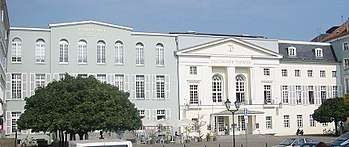Deutsches Theater (Berlin)
The Deutsches Theater in Berlin is a well-known German theater. It was built in 1850 as Friedrich-Wilhelm-Städtisches Theater, after Frederick William IV of Prussia. Located on Schumann Street (Schumannstraße), the Deutsches Theater consists of two adjoining stages that share a common, classical facade. The main stage was built in 1850, originally for operettas.

Adolf L'Arronge founded the Deutsches Theater in 1883 with the ambition of providing Berliners with a high-quality ensemble-based repertory company on the model of the German court theater, the Meiningen Ensemble, which had been developed by Georg II, Duke of Saxe-Meiningen and his colleagues to become "the most widely admired and imitated company in Europe", thanks to its historically accurate sets and costumes, vividly-realized crowd scenes, and meticulous directorial control.[1]
Otto Brahm, the leading exponent of theatrical Naturalism in Germany, took over the direction of the theater in 1894, and applied that approach to a combination of classical productions and stagings of the work of the new realistic playwrights.[2]
One of Brahm's ensemble, the legendary theater director Max Reinhardt, took over the directorship in 1904. Under his leadership it acquired a reputation as one of the most significant theaters in the world.[3] In 1905 he founded a theater-school and built a chamber theater. Reinhardt remained the artistic director of the theater until he fled Nazi Germany in 1933.[2]
The Deutsches Theater remains one of the most prominent companies in Berlin.[2]
Works cited
- Banham, Martin, ed. 1998a. "Deutsches Theater." In The Cambridge Guide to Theater. Cambridge: Cambridge University Press. ISBN 0-521-43437-8. p. 294.
- ---. 1998b. "Meiningen company." In The Cambridge Guide to Theater. Cambridge: Cambridge University Press. ISBN 0-521-43437-8. p. 718.
- Willett, John and Ralph Manheim. 1970. Introduction. In Collected Plays: One by Bertolt Brecht. Ed. John Willett and Ralph Manheim. Bertolt Brecht: Plays, Poetry and Prose Ser. London: Methuen. ISBN 0-416-03280-X. p.vii-xvii.
Notes
- Banham (1998a) and (1998b).
- Banham (1998a).
- "[In 1924, Brecht] was about to go as a 'dramaturg', or literary advisor, to Max Reinhardt's Deutsches Theater in Berlin, at that time one of the world's three or four leading theaters." (Willett and Manheim 1970, vii).